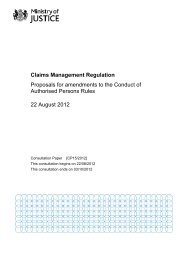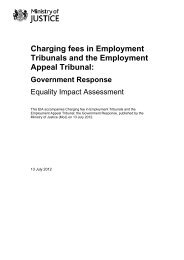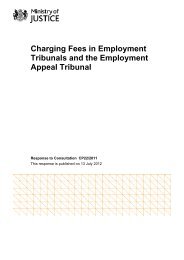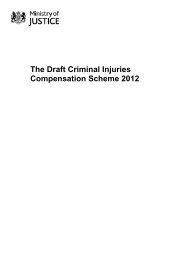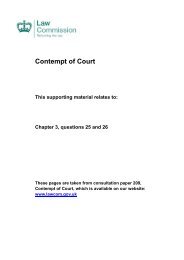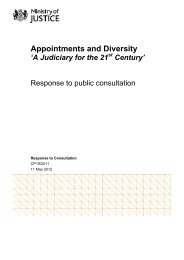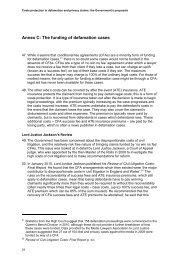Administrative Justice and Tribunals Council ... - Consultation Hub
Administrative Justice and Tribunals Council ... - Consultation Hub
Administrative Justice and Tribunals Council ... - Consultation Hub
You also want an ePaper? Increase the reach of your titles
YUMPU automatically turns print PDFs into web optimized ePapers that Google loves.
eform of the current system is in this way dependent upon thorough judicial<br />
oversight <strong>and</strong> national leadership. Mencap is concerned that by removing the single<br />
oversight which the system needs, any reforms will be fractured, lacking in<br />
leadership <strong>and</strong> piecemeal.<br />
It is also widely recognised that the role of the Chief Coroner requires complete<br />
impartiality <strong>and</strong> independence in order to have full confidence from the public when<br />
determining appeals <strong>and</strong> conducting inquests. This can only be achieved through a<br />
specifically appointed individual who is proven to have no vested interests <strong>and</strong> is<br />
universally perceived as such.<br />
Inability to respond to users’ needs<br />
The proposals to abolish the abolishing the <strong>Administrative</strong> <strong>Justice</strong> <strong>and</strong> <strong>Tribunals</strong><br />
<strong>Council</strong> (AJTC) <strong>and</strong> Courts Boards are of immediate concern. Whilst these bodies<br />
appear to perform a largely administrative function, Mencap maintains that they are<br />
essential in order to ensure the user perspective is able to influence the design <strong>and</strong><br />
operation of the justice system.<br />
The consultation document itself acknowledges the role of the TPC <strong>and</strong> the AJTC in<br />
particular in ensuring that people who use the system are adequately represented.<br />
Underst<strong>and</strong>ing the needs of users is an important <strong>and</strong> challenging function that<br />
requires a degree of expertise which is currently well represented in these bodies.<br />
People with a learning disability may require extra support to communicate, meaning<br />
st<strong>and</strong>ard feedback <strong>and</strong> consultation fails to acknowledge their needs. Public bodies<br />
such as the AJTC <strong>and</strong> Courts Boards have established experience in determining<br />
those needs <strong>and</strong> are better placed to translate this underst<strong>and</strong>ing into changes that<br />
will improve the ability of people with a learning disability to access the justice<br />
system.<br />
As such the bodies provide a specialist <strong>and</strong> technical function in analysis of<br />
customer needs which could not currently be replicated elsewhere. Mencap<br />
recommends that the bodies are maintained <strong>and</strong> that the department increases<br />
efforts to underst<strong>and</strong> the needs of all users of the system through accessible<br />
consultation <strong>and</strong> feedback from.<br />
Lack of clarity on transitional arrangements<br />
The programme of change proposed by the Public Bodies Bill has the potential for<br />
wide ranging <strong>and</strong> significant impact on the future of the justice system. It is therefore<br />
of considerable concern that the consultation document lacks a full consideration of<br />
the need for transitional arrangements to be made. There is a high risk that without<br />
these arrangements, essential functions of the justice system will either be<br />
www.mencap.org.uk<br />
Registered charity number 222377 Page 7 of 10



